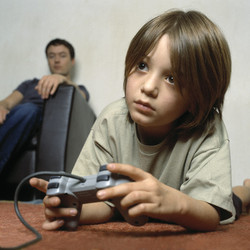Are kids at grass roots level playing enough football? Following on from our previous blog on “changes in youth development”, we wanted to focus on the amount of football being played at grass roots level. Whether it’s on the park with friends, or training with a local club, are England’s kids spending the right amount of time with a football at their feet?
The average grass roots child in England from U-10’s through to U-16’s might receive 1 hour of training, and play 1 hour in a match in the space of 1 week. At school the average child participates in 2 hours worth of physical education per week (but this is not always football). What the kids do outside of school away from organised football is sometimes limited – (Weather, Child Safety, Xbox, TV, and Internet!). I think it’s safe to say that a majority of kids don’t rush home from school and go straight to the park anymore! In fact, it has been said that on average, a child plays up to 14 hours of video games per week!!!
So we can work out that roughly, a child aged 10-16 years might play anything from 3 – 6 hours of football per week.
 Now consider this:
Now consider this:
K. Anders Ericsson, a psychologist at Florida State University researched into the amount of hours of practice and game time that it takes an individual to become an expert. He came up with the figure of 10,000 hours being what is needed for an athlete to become a master in his/her chosen sport. Now I’m no mathematician but I have put my limited mathematical skills to the test!
From the age of 10, if a child were to play 4.5 hours of football a week, that would work out at roughly 40 minutes of football per day, and would take them until around the age of 53 years old until they were considered an “expert” using Mr. Ericsson’s theory. Due to age, a footballer’s career is often short lived, so to be a master of the game at age 53 seems an extremely unlikely scenario.
Compare this to the likes of Lionel Messi, Xavi and Andres Iniesta, who regularly clocked up around 2-3 hours of football a day from a young age and are presently considered “experts” or “masters” of the game. Are our youngsters in this country getting anywhere near this sort of time dedicated to playing?
It is said that actual time spent playing in a football match as opposed to playing on the park or practicing, is a big factor in the development of young players. This theory isn’t exactly rocket science, as the more a player is used to playing in a competitive match and dealing with match situations, the better they will adapt and learn.
Statistics show that in England young footballers at grass roots level up until the age of 16 will have played roughly between 150 – 200 matches of football. Now, compare this to Spain, where by the age of 16 a young Spanish footballer will have already played in 500 matches! More than double that of a child in England!
These statistics don’t apply to every young budding footballer, of course there will be exceptions, some footballers are naturally more gifted than others, but these figures just give a little insight into the amount of time, hard work and dedication needed to succeed in the beautiful game.





